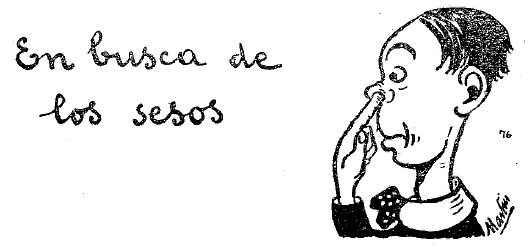
| Языки :: Испанский |
| Аудио |
 |
|
|
213 |
Español |
Spanish |
|
Lección Setenta y seis (76) |
||
| La casa ha venido a menos (1) | The house has gone down. | |
| 1 |
¿No ha pasado usted al buffet? — No, dije sencillamente (2). |
You have not passed at the buffet? — No, I said naively. |
| 2 |
Soltó una carcajada. — Pues allí lo tiene usted, en aquel rinconcito (3). |
She burst out laughing [uttered a peal of laughter]. Well you have it over there, in that little nook. |
| 3 |
¡ Qué loca eres, Pepita! exclamó Juanita, riendo también (4). |
What a mad thing you are, Pepita! exclaimed Janet, laughing too. |
| 4 |
En el rincón que señalaba con la mano había una mesilla, y sobre ella una botella de agua con algunos vasos (5). |
In the corner that she showed with her hand, there was a small table,
and on it a bottle of water with a few glasses. |
| 5 |
En nuestros buenos tiempos, poníamos azucarillos (6). Era el siglo de oro de esta casa. |
In our good days [times], we used to put azucarillos. It was the golden age of this house. |
| 6 |
Ahora, hijo mío, estamos en plena decadencia. Ni la casa de Austria ha venido nunca tan a menos. |
Now, my dear, we are in full decadence. Even [nor] the House of Austria has never gone down so low. |
| 7 | Fuera los azucarillos, que gravan el presupuesto (7). | Farewell [out] the azuc. which burden the budget. |
| 8 |
Luego, no crea usted, había aquí muchos que se los comían secos
por golosina. ¡Una ruina, hijo, una ruina! (8) |
Then, you will [do] not believe it, there were many here who ate them dry, out
of greediness. [A] ruin ! man, ruin! |
| 9 | ¿Ve usted aquel pollito... aquel que se mete el dedo por la nariz en busca de los sesos? (9) | Do you see that youngster over there, the one who thrusts his finger into [by] his nose, in search of his brains? |
| 10 | Pues ése se ha comido trece una noche, y no le pasó nada. | Well, that one ate up thirteen one night and nothing happened to him. |
| 11 |
Por supuesto, yo le eché de casa inmediatamente; pero volvió al día siguiente pidiendo perdón (10) y que no lo haría más. |
Of course, I threw him out of the house immediately; but he came back the following day, begging pardon, and (saying) that he would do it no more. |
| (Armando Palacio Valdés, La Hermana San Sulpicio.) | (A.-P. Valdés, Sister San Sulpicio.) |
|
Cantar Es el amor un niño que, cuando nace, con poquito que coma (cielito lido (sic.) ), se satisface; ¡ay, ay, ay, ay! pero en creciendo, cuanto más le van dando, (cielito lindo) más va queriendo. |
Love is a child — who when he's born — with the little he eats — (my pretty sky) is satisfied; alas in growing up — the more they give him — the more he wants. |
|
Satisfacer, satisfecho : to satisfy, satisfied. — Crecer : to grow. — Le van dando, va queriendo : go giving him, goes wanting : this expression marks continuity, repetition, which would not be done by "cuanto más le dan, más quiere". |
|
| NOTES. | |
| 1 | Venir a menos, "to come to less", to go down, be decadent. |
| 2 |
Bufet (booffait) is said only of a private refreshment-bar. The refreshment-room in a station is la fonda de la estación. The piece of furniture (sideboard) : el aparador. — Sencillo, sencillamente mean simple, simply or naive, naively. |
| 3 |
Soltar, to utter, let out. Una carcajada (a picturesque word, with imitative ja (Ha) : a peal of laughter. — El rincón, the corner (angle); whereas la esquina is the (jutting) corner : la esquina de la calle. — Rinconcito : a diminutive of rincón, a little corner, nook. |
| 4 |
Pepita, familiar for Josefina. — Juanita (Hwa), fam. for Juana (Hwanna) : Jane. — Juan (Hwan), John becomes Juanito (Hwánito) : Johnny, Jack. |
| 5 |
Mesa, table; mesilla, small table. Velador, Pedestal table. |
| 6 | See less. 77, par. 5. |
| 7 |
Fuera, outside; dentro, inside. — Gravar, to burden; grabar, to engrave; el grabador, the engraver; el grabado, the engraving. |
| 8 | ¡Hijo! or ¡Hijo mío! are used with meaning of , "my dear", etc... |
| 9 |
Un polio, a chicken, or a youngster, "young
cock". — Diminutive : pollito. — El seso or los sesos, the brain(s). |
| 10 |
Suponer, to suppose; por supuesto, "for supposed ", as you may suppose, of course. — Echar, to throw or pour. Echar de casa, to throw out of the house. — Pedir perdón, to beg pardon. Yo pido, Vd. pide, I beg, you beg. Yo pediré, Vd. pedirá, I shall, you will beg; pedido, begged, asked. |
